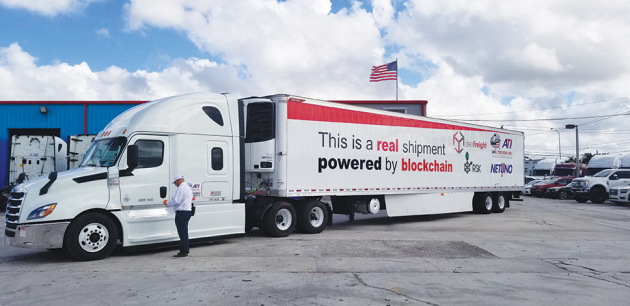Blockchain delivers
SUNRISE, Fla. — The first trucking shipment using blockchain and a smart contract has been made. The shipment was made using dexFreight, a decentralized logistics platform.
The shipment was a 5,320-lb frozen food load hauled from Preferred Freezer Services in Medley, Fla., to Manny’s Enterprises in Sunrise, Fla., on Oct. 15. The load was delivered by Arel Trucking.
The smart contract was secured by Bitcoin. Funds for the transaction were held in escrow by the smart contract on the RSK smart contract platform, and were automatically released to the carrier upon delivery.
“This is a huge milestone towards an imminent transformation of the logistics industry through the adoption of blockchain technology,” said Rajat Rajbhandari, CEO and co-founder of dexFreight. “Our platform aims for a truly decentralized model, open to all the stakeholders, and allowing for a new world of services that will bring much needed optimization and liquidity to this industry.”
“With the use of smart contracts, companies like dexFreight can transfer value and assets between parties on our platform,” added Diego Gutierrez, CEO of RSK. “With a defined set of rules, in this case for logistics, all participants know that their business needs will be fulfilled without anyone altering their agreement or changing the rules.”
dexFreight says it will offer unprecedented transparency, accountability, and trust within the supply chain.
“dexFreight solves the issue of false documentation by making our transactions with shippers completely transparent, and so we can get paid for the service we provided,” said Robert J. Julia, CFO, Arel Trucking. “This technology is the way of the future for the whole trucking industry.”
The blockchain concept emerged amid a “mashup” of maturing technologies, explained Ken Craig, vice-president of special projects at McLeod Software, during a presentation at the American Trucking Associations’ Management Conference & Exhibition in October. The internet improved, peer-to-peer networks and distributed databases strengthened, computing speeds increased, storage costs dropped, and cryptography advanced.
Blockchains build on it all, offering a tool for participants to share documents – a general ledger of sorts. While blocks of information can be added, none of the interconnected pieces can be changed or deleted.
“Blockchain is a fairly complicated technology,” Craig admitted, noting how people grasp onto concepts they tend to understand best. But it essentially establishes a continuous, comprehensive chain of individual transactions known as blocks.
In trucking, that infrastructure could support secure transactions and communication, smart transportation contracts, and even autonomous vehicles and maintenance, said Brad Taylor, vice-president of data engineering, artificial intelligence, and machine learning at Omnitracs.
Walmart, for example, has developed a blockchain to establish a chain of custody for perishable products as they move through the supply chain. “This is a good thing for us,” Craig said. “This will help us define the standards that we’re looking for.”
“Blockchain technology is here, and it will be disruptive, but it’s in its infancy,” added Craig, who expects blockchain to be widely adopted by 2026.
The challenge is that some business managers are facing pressure to establish a blockchain without knowing how it fits into business goals, he said. “All this hype is really driving and putting pressure on businesses.”
Closer to home, the Canada Border Services Agency (CBSA) has agreed to pilot a blockchain shipping solution called TradeLens, developed jointly by IBM and A.P. Moller–Maersk.
The CBSA processes more than 58,600 commercial releases, 14,400 trucks, 240,000 mail items, and 127,400 courier shipments, collecting more than $88,200,000 in duty and taxes on an average day.
It says participating in the TradeLens pilot will be to determine what role the platform could play in its business processes. Ultimately, the goal would be to see if this type of solution can help improve the quality and timeliness of commercial data, increase visibility of cargo movement past the first port of arrival and reduce the number of transactions necessary to make a release decision for shipments.
“This development is an example of the Government of Canada using innovative technology to easily and securely facilitate trade and engage in global trading ecosystems in a modern, productive manner,” said John Ossowski, president, CBSA. “TradeLens could create a singular, trusted digital supply chain for all shipments entering Canada. The TradeLens pilot gives us an opportunity to not only find process efficiencies and gain analytical insights, but improve data providence, accuracy and targeting capabilities. The end result may be a faster and more reliable national supply chain, which could positively impact Canada’s economic output.”
According to Maersk and IBM, TradeLens participants can track vital import and export data in real-time with a secure audit trail.
“We believe blockchain can play an integral role in digitizing and reinventing shipping for agencies like the CBSA, who are responsible for moving nearly 500,000 commercial transactions safely across Canadian borders daily. TradeLens provides a common approach to building a strong, secure and connected digital trade network that benefits all participants equally,” said Ayman Antoun, president, IBM Canada.
Have your say
This is a moderated forum. Comments will no longer be published unless they are accompanied by a first and last name and a verifiable email address. (Today's Trucking will not publish or share the email address.) Profane language and content deemed to be libelous, racist, or threatening in nature will not be published under any circumstances.